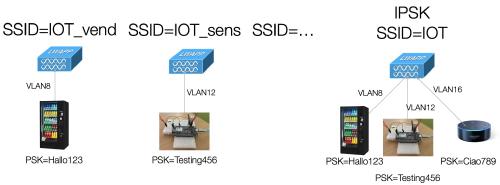
IPSK


Meraki IPSK with FreeRADIUS
This is a follow up to my Post IPSK on Cisco without ISE but FreeRADIUS. The FreeRADIUS server has already been running in the state since that post, and I will show what has to be done specific to the configuration when working with Cisco Meraki APs.
Meraki’s IPSK comes in two flavors: with RADIUS server and without.
The “without” option lets you configure multiple PSKs that are valid to every client that knows them. Numerous vendors support this system, and the AP basically tries all valid PSKs on client join to find the one that matches. The issue with this approach is that it can’t work with WPA3. With WPA3 (and with that, I mean WPA3-SAE, not 802.1X) the AP has to know the correct secret and has no chance of trying multiple possibilities. One vendor claims to have worked around that, but there have yet to be any technical details.
This leaves us with “Identity PSK with RADIUS” - because we “pre-register” our clients with MAC-address in our RADIUS-Server, the AP can query it for the correct passphrase as soon as it receives a join from a client, which makes this possible with WPA3-SAE. But, as of today, Meraki APs (version MR 30.6) do not support this yet. Ciscos 9800 controller supports this starting from 17.9.2, so we can hope that Meraki will support this soon too. The security issue itself is not that big, because some of the weaknesses of WPA2-PSK are a bit offset by IPSK, but missing WPA3 support also means no IPSK in 6 GHz, as WPA3 is required for the 6 GHz band.
Having said the theoretical parts of this post, let’s get to configuring.

IPSK on Cisco without ISE but FreeRADIUS
What is IPSK?
The concept is not new, other wireless vendors had this or similar features for a while (often named PPSK, DPSK, or MPSK, all with a bit different functionality), but some time ago Cisco released “Identity PSK”, or short, “IPSK”. It has been available on AireOS since version 8.5 and on the 9800 controller since the beginning (16.10) - I did my first experiments with it on AireOS 8.5 and made it into a new service on our campus on 16.10 back then.
As the name suggests, it is a PSK authentication, but not every client on the SSID has to have the same PSK. You can group them by department, or type, or can even give every single device its own PSK. Additionally, with dynamic VLAN assignment (which has been possible forever), this leads to great grouping and security zones. This is why this solution is so great for IOT:
- They can typically not use 802.1X
- You want to separate them, e.g. cameras, sensors, displays, weird printers
- You don’t want to use a separate SSID for every type, because of SSID overhead
IPSK makes it possible to have this on one SSID:

The solution is typically to use a Cisco ISE to configure the auth side of the equation. But it does not have to be ISE - any RADIUS implementation that can send some attributes will work.
This is why I chose to show you how it is done in the great open-source RADIUS server FreeRADIUS.
